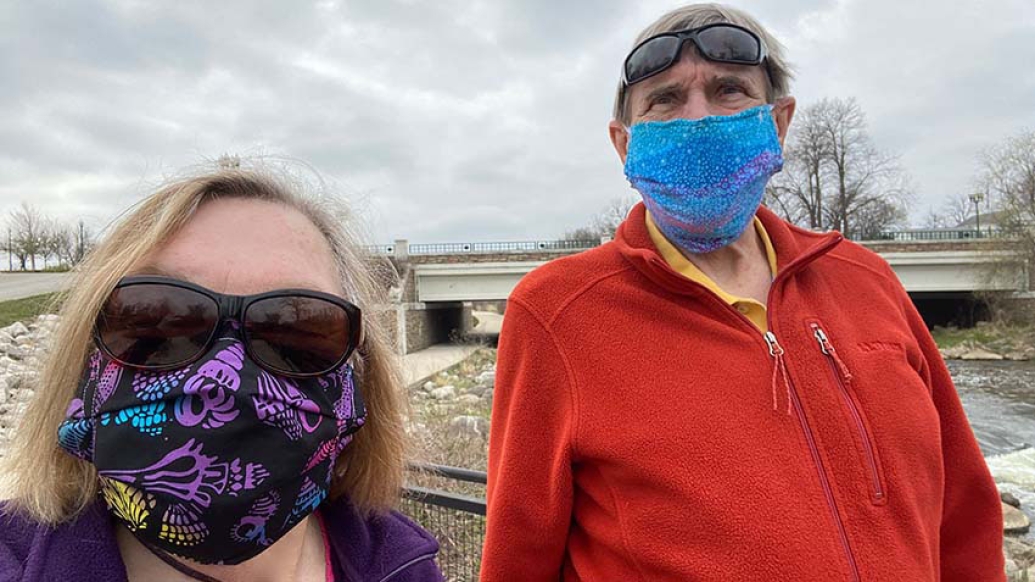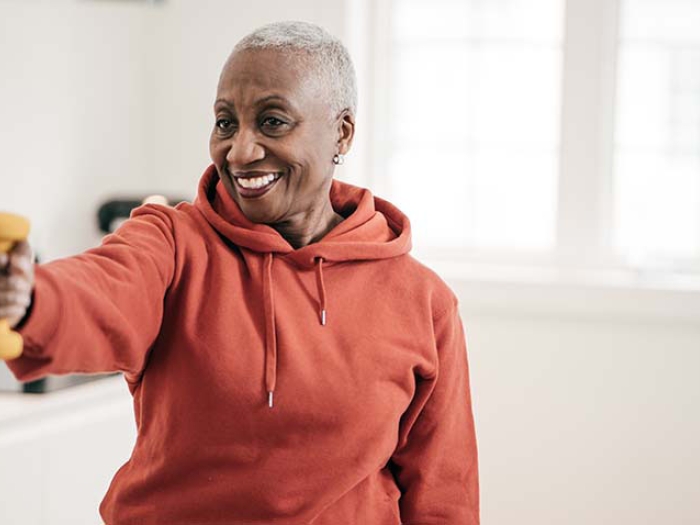Embracing home-based cardiac rehab was easy for one woman with guidance from a Michigan Medicine exercise physiologist.
5:00 AM
Author |

Editor's note: Information on the COVID-19 crisis is constantly changing. For the latest numbers and updates, keep checking the CDC's website. For the most up-to-date information from Michigan Medicine, visit the hospital's Coronavirus (COVID-19) webpage.
Interested in a COVID-19 clinical trial? Health research is critical to ending the COVID-19 pandemic. Our researchers are hard at work to find vaccines and other ways to potentially prevent and treat the disease and need your help. Sign up to be considered for a clinical trial at Michigan Medicine.
Timing was on Teri Teeri's side when it came to her open heart surgery for mitral valve disease and atrial fibrillation on February 25 this year. But the same couldn't be said for her recommended follow-up cardiac rehabilitation.
That's because rehab programs throughout Michigan were suspended due to COVID-19 – the day before Teeri was scheduled to begin her on-site Michigan Medicine Cardiac Rehabilitation program.
But that didn't faze the determined 76-year-old, who wanted to get on the road to recovery. She quickly embraced the Home-Based Cardiac Rehabilitation program offered by Michigan Medicine.
One step at a time
Teeri, who has been treated at Michigan Medicine for atrial fibrillation since 2007, was diagnosed with mitral valve regurgitation last December while she and her husband, Jim, were living as snowbirds in Florida. When her doctor there indicated she needed surgery to repair her mitral valve and treat her atrial fibrillation, the couple headed back to their Ann Arbor home, close to Michigan Medicine and their cardiologists.
A former nurse, Teeri understood the severity of her condition. "I needed open heart surgery, but definitely wanted to be at the University of Michigan for it," she says. She felt fortunate to have been scheduled for surgery with Matthew Romano, M.D., a cardiac surgeon at the Frankel Cardiovascular Center, just before the extensive spread of COVID-19.
MORE FROM MICHIGAN: Sign up for our weekly newsletter
Once she got her doctor's approval, Teeri was eager to begin the next step in her recovery: cardiac rehab. Having accompanied her husband four years earlier to his rehab sessions, she knew what to expect and welcomed the challenge.
"I've always been active and I was ready to get back to exercising," she says, aware that it would be more restricted than her pre-surgery workout level. "But one month after my surgery, the lockdown went into effect and I realized there would be no on-site cardiac rehab for me."
Adapting to COVID-19
"When our on-site program ceased operations due to COVID-19, newly referred patients were placed on hold," says Michigan Medicine exercise physiologist Diane Perry. "But for those with a heart disease diagnosis, our services are a valuable part of each patient's recovery process. Our home-based platform allows us to continue to deliver guided exercise and education as well as behavioral coaching and support in a unique way."
SEE ALSO: Seeking Medical Care During COVID-19
The program is working, says Teeri. "I find it very helpful to have weekly calls from a U-M exercise physiologist to see how I'm doing, to explain goals and exercise options and to answer any questions I have. It helps me to know that what I'm doing is appropriate for my stage of recovery."
Under Perry's guidance, Teeri says cardiac rehab is helping her heart feel stronger. "Diane gave me guidance about what I should be doing," she says, noting that she didn't want to overstress her heart. "We also talked about nutrition," especially important now that Teeri is taking the blood thinner coumadin, which requires strict dietary adherence.
Tips for success
A month into her program, Teeri has advice for her fellow home-based rehab patients. "Be active every day and move about the house or outside as you're able." This, she says, could include walking outside or riding a stationary bicycle inside. Teeri typically rides her indoor bicycle twice a day for a total of 45 minutes.
Like Podcasts? Add the Michigan Medicine News Break to your Alexa-enabled device or subscribe for daily updates on iTunes, Google Play and Stitcher.
"Do a little more each day and keep track of your progress, whether with a fitness tracker or a daily journal." Just as important, she says, "Stay positive and know your heart will be stronger the more you exercise in a consistent way."
Teeri says she'll remain committed to her home-based exercise program because being active has always been an important part of her daily routine. But she looks forward to joining others at the Michigan Medicine on-site Cardiac Rehab program once the suspension is lifted. "I'll keep doing what I'm doing but will definitely go there when it re-opens. I like the idea of having an exercise physiologist making sure I'm doing things right."
SEE ALSO: Keeping Our Patients Safe During COVID-19
Perry sees the benefits both type of programs offer. "Moving forward, having both on-site and home-based cardiac rehabilitation will provide more options for our patients," she says.
For now, Teeri is paying attention to her heart rate and knows what's safe for her, thanks to counsel from Perry. "I like to hear her professional opinion so I don't do too much or too little."
A little guidance and reassurance, she says, goes a long way toward her ongoing recovery.

Explore a variety of health care news & stories by visiting the Health Lab home page for more articles.

Department of Communication at Michigan Medicine
Want top health & research news weekly? Sign up for Health Lab’s newsletters today!





